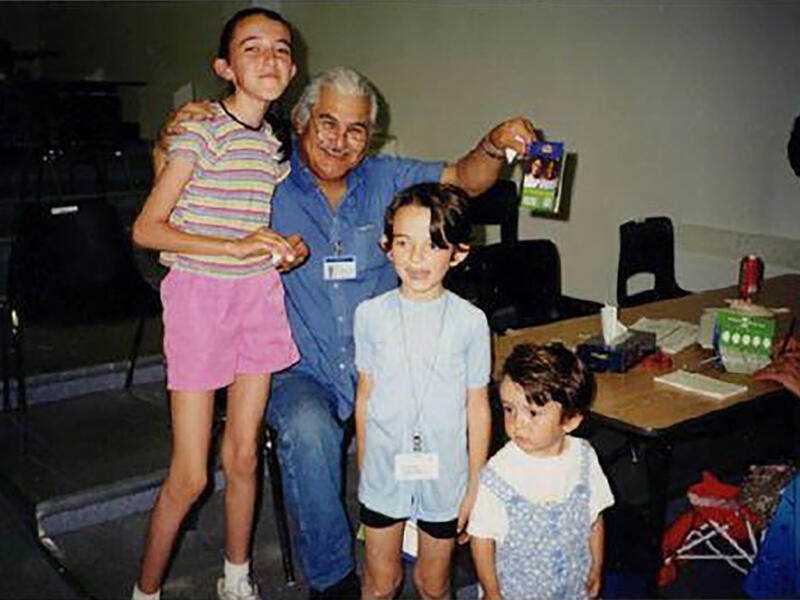
Uncovering your own past through digital archives
When History MA graduate Krenare Recaj found a photograph of herself as a young refugee in a museum's archival collection, her master's research path was set

When History MA graduate Krenare Recaj found a photograph of herself as a young refugee in a museum's archival collection, her master's research path was set
By Kaitlin O'Brien Faculty of ArtsWhen students conduct research, they expect to encounter a wide range of documents, theories and perspectives to support their critical inquiry, but what they probably don’t expect to encounter is an historical image of themselves.
This is what happened to Krenare Recaj, who is graduating this week with her MA in History. Looking through the online archives of Pier 21 Museum of Immigration in 2019, she stumbled upon a photo of herself, her sisters, and a stranger. The photo was labelled, “Photograph of Kosovar refugees at CFB Borden, 1999,” but no other information was provided.
While Krenare’s mother was unaware that the photo even existed, she remembered the events surrounding the photograph, and was able to provide context: it had been taken at Canadian Forces Base Trenton, not Borden, and the booklets held up by Krenare and her sisters in the photo contained their fingerprints. Krenare’s mother then located a box within her home with the exact fingerprint booklets that served to identify the young girls as refugees.

Krenare Recaj (far right) and her sisters arriving at Canadian Forces Base Trenton from Kosovo in 1999. Source: Pier 21 Museum of Immigration digital archives.
In the spring of 1991, Krenare was one of 7,291 Kosovars that lived on military bases across Canada after the United Nations High Commission for Refugees sent out an urgent request for countries to support.
For Krenare, this experience of finding the photo reinforced her desire to study and write about the history of Canada and Kosovo and the settlement of refugees. “I firmly believe that overlooked events are often underestimated in importance,” she says. “Not everyone will find a photo of themselves at the Pier 21 Museum in Halifax, but everyone can bring attention to overlooked aspects of history.”
Her research explores the history of Canadian foreign affairs and its relationship to Kosovo. Her master’s thesis, titled “Sovereignty Sensitivity and Diaspora Discontent,” looks at how domestic concerns influenced Canadian foreign policy towards Kosovo in 1999. A key component of her master’s and future doctoral research is the involvement of oral history. “By exploring both the experiences of Kosovars in Canada and the effect their settlement had on Canada’s history and international relations, my research bridges social, cultural, and political history,” she explains.
Krenare received support in a variety of forms during her graduate studies. “A lot of the time academia is viewed as a “solo sport” and it can seem isolating, but in the History department it felt like I was part of a team,” she says. For instance, when she was accepted to present at a pricey conference, Professor Susan Roy stepped in to offer financial support; and Professor Ian Milligan and Professor Ryan Touhey helped Krenare reach her goal of getting published in a peer-reviewed journal by providing her with in-depth, thoughtful feedback for each of her articles. Dr. Andrew Hunt spent hours writing her reference letters.
Her academic journey was at times challenging, but the results have made the experience tremendously rewarding. At the beginning of her master’s, she experienced rejection in a number of forms including when she applied for large scholarships, when she applied to present at conferences, and when she attempted to get published in peer-reviewed publications. Krenare’s supervisor, Professor Ryan Touhey, continued to reinforce that as long as she stayed focused on her coursework and her thesis, she would write articles of publishable quality.
A year later, Krenare has two articles accepted for publication in peer-reviewed journals, Canadian Journal of History and Journal of Military and Strategic Studies, and she has been accepted to present at seven conferences. Moreover, she has been accepted by Carleton University with a great scholarship offer to pursue her History PhD — and she won a SSHRC Doctoral Fellowship worth $80,000.
“I am happy not only because my application was successful but also because I learned the value of mentorship and support,” she says. “It truly felt like my professors and colleagues wanted me to succeed. I am deeply thankful for my History professors who have made a positive impact on my academic journey.”

Read more
Researchers awarded funding to investigate ecology, climate change, repatriation, health and well-being through cultural and historical lens

Read more
Dr. Naila Keleta-Mae discusses her latest album and what it means for her to create music rooted in Black traditions of activism and imagination

Read more
Discover how Waterloo alumni are driving Canada’s economy with five tech companies making a local and global impact
The University of Waterloo acknowledges that much of our work takes place on the traditional territory of the Neutral, Anishinaabeg, and Haudenosaunee peoples. Our main campus is situated on the Haldimand Tract, the land granted to the Six Nations that includes six miles on each side of the Grand River. Our active work toward reconciliation takes place across our campuses through research, learning, teaching, and community building, and is co-ordinated within the Office of Indigenous Relations.